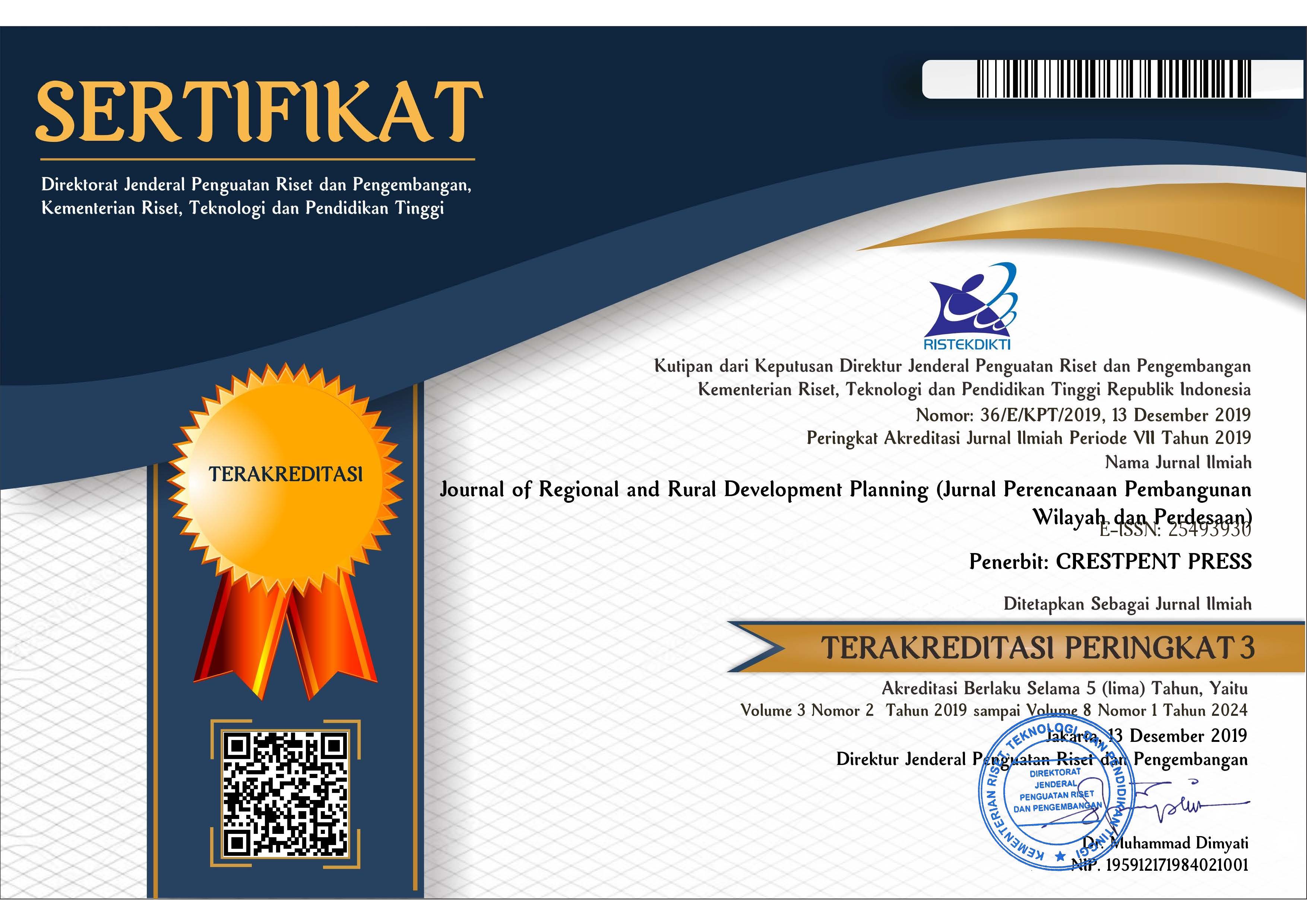Kajian Pengelolaan Sampah Berdasarkan Daya Dukung dan Kapasitas Tampung Prasarana Persampahan Kota Depok
Abstract
Depok City can only manage about 56.22% from total of 1,286 tons of its daily solid waste. The amount increases everyday that it becomes more concerning to apply solid waste management. The objective of this research is to analyze solid waste management based on the carrying capacity and the storage capacity of waste infrastructures in Depok City. Methods of this study were the suitability between supply and demand of domestic solid waste and the waste infrastructures, Integrated Risk Based Approach (IRBA) and literature study. This study shows that Depok City government has a good system in solid waste management but still needs to improve the quantity and capacity of the infrastructures. Garbage banks can reduce 20% of the inorganic waste and the Organic Waste Processing Unit (Unit Pengolahan Sampah Organik/UPS) has low index carrying capacity of 0.26, which can reduce 3.64% of organic waste. The IRBA shows that Cipayung landfill has moderate danger. The numbers of waste infrastructures required at each district in Depok City shall be equipped, so that the amount of waste disposed to Cipayung landfill can be reduced.References
Abah, S.O. & Ohimain, E.I. (2010). Assessment of Dumpsite Rehabilitation Potential Using the Integrated Risk Based Approach : a Case Study of Eneka, Nigeria. World Applied Sciences Journal. 8(4): 436-442
Astono, W., Purwaningrum, P. & Wahyudyanti, R. (2015). Perencanaan tempat Pembuangan Akhir Sampah dengan menggunakan Metode Sanitary Landfill Studi kasus : Zona 4 TPA Jatiwaringin, Kabupaten Tangerang. Jurnal Teknik Lingkungan. 7(1): 7-16
[BPS] Badan Pusat Statistik. (2017). Persentase Rumah Tangga Menurut Provinsi dan Perlakuan Memilah Sampah Mudah Membusuk dan Tidak Mudah Membusuk, 2013-2014. www.bps.go.id/linkTabelStatis/view/id/1360 [14 April 2017].
Dewi, R.S. (2008). Evaluasi Ekonomi dan Sosial Unit Pengolahan Sampah (UPS) Kota Depok. [Skripsi]. Bogor (ID) : Institut Pertanian Bogor
Handono, M. (2010). Model Pengelolaan Tempat Pemrosesan Akhir (TPA) Sampah secara Berkelanjutan di TPA Cipayung Kota Depok-Jawa Barat. Disertasi. Bogor (ID) : Institut Pertanian Bogor
Heimlich, J.E., Kerry, L.H., & Ann, D.C. (2007). Integrated Solid Waste Management. Extension Factsheet. Ohio (US) : The Ohio State University
Jati, T. K. (2013). Peran Pemerintah Boyolali dalam Pengelolaan Sampah Lingkungan Permukiman Perkotaan. Jurnal Wilayah dan Lingkungan. 1(1) : 1-16
Joshi, R. & Sirajuddin, A. (2016). Status And Challenges Of Municipal Solid Waste Management In India: A Review. Cogent Environmental Science.2 (1139434) : 1-18
[KemenLHK] Kementerian Lingkungan Hidup dan Kehutanan. (2015). Rangkaian HLH 2015 – Dialog Penanganan Sampah Plastik. www.menlh.go.id [14 April 2017].
[KemenPU] Kementerian Pekerjaan Umum. (2013). Peraturan Menteri Pekerjaan Umum Republik Indonesia Nomor 03/PRT/M/2013 tentang Penyelenggaraan Prasarana dan Sarana Persampahan dalam Penanganan Sampah rumah Tangga dan Sampah Sejenis Sampah Rumah Tangga. Jakarta (ID): Kementerian PU
Khairunisa, V. (2011). Analisis Daya Dukung Lingkungan Dan Kelayakan Ekonomi Unit Pengolahan Sampah “Mutu Elok” Di Perumahan Cipinang Elok Jakarta Timur. Skripsi. Bogor (ID) : Institut Pertanian Bogor
Kurian, J., Esakku, S., Nagendran, R., & Visvanathan, C. (2005). A Decision Making Tool for Dumpsite Rehabilitation in Developing Countries. Proceedings of Sardinia 2005, Tenth International Waste Management and Landfill Symposium. Margherita di Pula, Cagliari, Italy: 3-7 October 2005
Mayangkara, A.P. (2016). Evaluasi Kebijakan Pengelolaan Sampah TPA Gunung Panggung Kabupaten Tuban. Jurnal Penelitian Administrasi Publik. 2(2): 427-444
Nguyen, U.N. & Hans, S. (2009). Sustainable Solutions for Solid Waste Management in Southeast Asian Country. Waste Management. 29(2009):1982-1995
Othman, S.N., Zainura, A.N., Ahmad, H.A., & Rafiu,O.Y. (2013). Review on Life Cycle Assessment of Integrated Solid Waste Management in Some Asian Countries. Journal of Cleaner Production. 41 : 251–262
Pemerintah Kota Depok. (2016). Laporan Akhir Kajian Teknis Tanah TPA Kota Depok. Depok (ID) : Pemerintah Kota Depok
Pemerintah Kota Depok. (2015). Peraturan Daerah Kota Depok Nomor 1 Tahun 2015 Tentang Rencana Tata Ruang Wilayah (RTRW) Kota Depok Tahun 2012 – 2032. Depok (ID) : Pemerintah Kota Depok
Pravitasari, A.E., Izuru, S., & Ernan, R. (2016). Towards Resilience of Jabodetabek Megacity: Developing Local Sustainability Index with Considering Local Spatial Interdependency. International Journal Sustainable Future for Human Security, 4(1) : 27-34
Sujiyanto. (2016). Analisis Pengelolaan Sampah di Bank Sampah Malang. Jurnal Ilmu Sosial dan Ilmu Politik. 5(3) : 115-122
Suryani, A.S. (2014). Peran Bank Sampah Dalam Efektivitas Pengelolaan Sampah (Studi Kasus Bank Sampah Malang). Aspirasi. 5(1) : 71-84
Tjiptoherijanto, P. (1999). Urbanisasi dan Pengembangan Kota di Indonesia. Populasi. 10(2) : 56-72
Zurbrügg, C. & Roland, S. (1998). Main Problems and Issues of Municipal Solid Waste Management in Developing Countries with Emphasis of Problems Related to Disposal by Landfill. Third Swedish Landfill Research Symposia. Lulea (SE) : SANDEC/EAWAG
Copyright (c) 2018 Journal of Regional and Rural Development Planning

This work is licensed under a Creative Commons Attribution-ShareAlike 4.0 International License.




.png)














